 |
 |
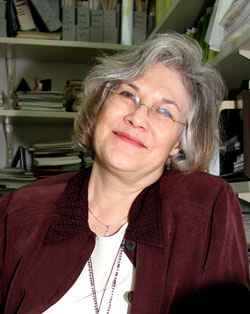
|
|
Christy Ludlow, Ph.D., Speech-Language Pathologist, National Institute of Neurological Disorders and Stroke (NINDS), National Institutes of Health (NIH)
|
1. I chose this career because...
2. My typical workday involves...
3. What I like best/least about my work...
4. May career goals are...
5. When I'm not working, I like to...
|
|
1. I chose this career because...
|
Back to Top

|
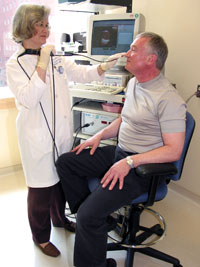
|
|
Christy Ludlow uses a video strobe monitor, which allows her to view muscle movements in the larynx.
|
I chose to become a speech and language pathologist, because of personal experiences and the career information I learned while in undergraduate school. My cousin and I were close friends before and during our teenage years. He stuttered badly, and I witnessed many of the challenges that he faced on a daily basis. During undergraduate school, I thought I wanted to go to medical school. During my interview for medical school, I was asked if I would devote 15 years of my life to medicine. At the time, that seemed like forever. I decided that I did not want to make that commitment.
One evening, there was a career night at McGill University, where I was working on my undergraduate degree. An invited guest presented career information about speech pathology and audiology. She talked about the clinical and research opportunities that existed in the field, both of which captured my interest. She invited the attendants to come and observe a therapy session. I watched a session of therapy with people who stuttered and thought it was very interesting. I entered the program and completed a dual tract program in speech pathology and audiology. After that, I did an internship in audiology. The science base in audiology was great. However, we did the same thing every day and I decided to focus my career on speech pathology. There was more variety and I liked the clinical and research opportunities that were available.
I worked for three years as a speech pathologist at the Rusk Institute of Rehabilitation Medicine, New York University Medical Center, in New York. While there, I worked with stroke patients who were undergoing rehabilitation and who had aphasia (a language disorder). I also worked as a research assistant and was more and more drawn to the research opportunities in the field. At the time, I felt I was only one step ahead of the patients in my knowledge and understanding. That is when I made the decision to go into research on a full-time basis. I returned to school to earn my Ph.D.
Education, Certification & Licensure
- Bachelor of Science, Physiological Psychology, McGill University, Montreal, Quebec Province, Canada
- Master of Science Applied, Speech Pathology and Audiology, McGill University, Montreal, Quebec Province, Canada
- Doctor of Philosophy, Speech Pathology and Psycholinguistics, New York University, New York City, New York
- Certification of Clinical Competence in Speech - Language Pathology, American Speech-Language-Hearing Association
- Licensed, Board of Examiners of Speech and Language Pathology and Audiology, Maryland
I am also board certified to treat adults with neurological communication disorders, by the Academy of Neurologic Communication Disorders and Sciences.
|
|
2. My typical workday involves...
|
Back to Top

|
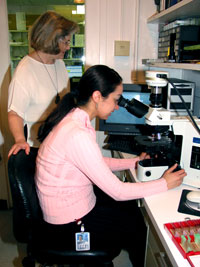
|
|
Christy Ludlow and Clinical Fellow, Kristina Simonyam, look at a patient's brain tissue under a microscope.
|
I see patients in the clinic who are participating in research studies. We approach our clinical research studies for a particular disorder in on one of 3 ways:
- Developing diagnostic criteria
- Developing new treatments
- Trying to understand the cause of the disorder, or its pathophysiology
Laboratory Research - Animal Models
In the lab, we work in animal models to test our hypotheses about the cause(s) of various disorders. For example, in one animal model, we are producing inflammation in the larynx (voice box) and then examining the resulting changes in the brain. We want to determine if this mimics a voice disorder that we see in adults called spasmodic dysphonia. Persons with spasmodic dysphonia have spasms in the laryngeal muscles and at times makes if difficult to understand the person when they speak. The onset of the disorder occurs in mid-life and we don’t know why. With our lab research, we are trying to understand the neurological underpinnings of these disorders.
Mentoring
On a regular basis I meet with postdoctoral fellows, and other students-in-training. I help them design their research studies, write articles and analyze their data. We meet one-on-one or in teams to discuss their research.
|
|
3. What I like best/least about my work...
|
Back to Top

|
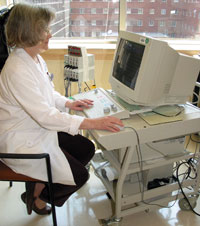
|
|
Christy Ludlow uses an electromyograph monitor to study muscle activity in the throat.
|
What I like best about my work is discovering new things. In research, there is a lot of problem solving. Once in a while you get an answer, a new effect, or idea, and that’s a high. That is what keeps me going.
What I like least about my work are the administration responsibilities. Those tasks include filling out request forms for equipment, for appointments of new staff, for clinical protocols, and animal protocols. It takes a lot of time and is not challenging. However it must be done carefully or else the program suffers.
|
|
4. May career goals are...
|
Back to Top

|
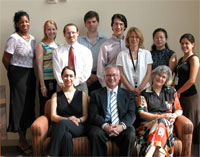
|
|
Christy Ludlow is pictured with the staff of the Laryngeal and Speech Section, National Institute of Neurological Disorders and Stroke, NIH.
|
My career goals are set for both immediate and long-term. My immediate goal involves a new project to help patients with chronic dysphagia as a result of a stroke, brain injury or a brain tumor. These patients can’t eat solid foods or feed themselves and often must be tube feed. I would like to develop a new treatment to help these patients.
For the long term, I would like to contribute new knowledge and understanding of the neurological basis for normal functioning of voice, speech and swallowing. With a better science base, we can develop treatments for dysfunctions affecting the central nervous system that limit voice, speech and swallowing functions.
***Update***
At the time of publishing, Ms. Ludlow was notified that she will be honored by the American Speech-Language-Hearing Association in November 2005 for her life-time contributions to the field (http://www.asha.org/about/leadership-projects/awards/Honors.htm).
|
|
5. When I'm not working, I like to...
|
Back to Top

|
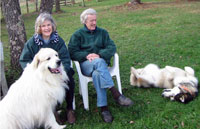
|
|
Christy Ludlow enjoys spending her free time with her husband and two dogs.
|
When I’m not working, I like to go with my husband to our small house in the country. I garden, growing vegetables and flowers. I just like mellowing out outdoors. I also have two large dogs and spend a lot of time chasing them.
|
|
|
|
 |